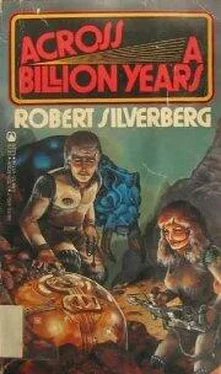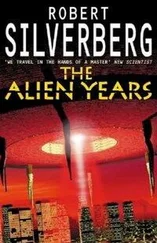Still, she was beautiful. The radiant image of voluptuous nineteen-year-old womanhood, a kind of dream creature. All androids are attractive, in a kind of standardized stereotyped way, but whoever had written the program for Kelly must have been a poet of the vats. Sitting there making sophisticated-type chatter with her, I felt vaguely like the hero of one of those tridim movies, forever enmeshed in romantic talk with mysterious beauties aboard spaceliners bound for remote ports.
However, nobody had been kind enough to hand me a script. I had to make up the dialogue as I went along. Kelly, now that I had rescued her from pestiferous Leroy, seemed willing to sit in the library and talk all night with me, but after the first ten minutes I found that I had exhausted my stock of light conversation. It isn’t easy to find much to say when you’re aboard an ultradrive cruiser, locked up in a sealed container where contact with the rest of the universe is impossible. You can’t even discuss the weather. Once you’ve talked about your reactions to the twisty-twisty of entering ultraspace, you’ve run dry.
For the sake of that mental image I had of myself as the star of a cool tridim (Tom Rice, Intergalactic Secret Agent), I had to find something to say. And so my mouth kept moving while my brain stalled. What is the one topic you should not discuss with a minority person? Why, what it feels like to be a minority person, of course. One should not risk stomping on toes, rubbing salt in wounds, focussing curiosity on a subject of which the minority person is heartily sick, etcetera. Naturally.
In horror and dismay I listened to my mouth say to Kelly Watchman, “I’ve never really had much social contact with androids, you know.”
She was adroit. “There aren’t very many of us.”
“No. That’s just it. You’ve always seemed so different that I’ve felt uneasy about you. I mean androids in general, not you in particular. It’s so hard for me to comprehend what it must be like to be android. To be just like a human being in every respect, and yet not to be…”
My voice trailed off stupidly.
“Not to be really human?” Kelly completed for me.
I was appalled. “Something like that.”
“But I am human, Tom,” she said mildly. “At least, in every legal sense. That’s been through the courts and settled. Whether you’re conceived in a womb or in a vat, you’re human if you have the human chromosome pattern, and you aren’t if you don’t. I do and I am.” She didn’t sound defensive or belligerent about it. She was simply stating facts. Kelly can’t ever get really emotional, no matter what her chromosomes are like.
I said, “Even so — I don’t need to explain this to you, Kelly — most people have this thing about looking upon androids as — well, not quite real.”
Kelly said serenely, “Perhaps it’s simply envy. The fact that we don’t age, that our predictable life-span is three times that of naturally conceived humans, must stir some hostility. I myself came from the vat in 2289, did you realize that?”
Nearly ninety. As I guessed.
“It’s partly that,” I conceded. “But there’s more. It’s that we created you. That makes you — this isn’t how I feel, you understand, but I know plenty of people who do — that makes you somehow occupy a rung below us in the order of things.”
“When a man and a woman create a child, do they therefore look upon it as something inferior to them?”
“Sometimes they do,” I said. “But that’s a side issue. Conceiving a child naturally is one thing. Making life in a laboratory vat is another. It’s almost godlike.”
“And so,” Kelly said, “you godlike ones show your godlike natures by feeling superior to the artificial humans you create. Even though androids outlive you and outperform you in most ways.”
“We feel superior to you and inferior at the same time, Kelly. And that’s why most of us dislike and distrust you.”
She pondered that. “How intricate you naturals can be! Why must you be so concerned about superiority and inferiority? Why not simply accept all distinctions and concentrate on matters of real importance?”
“Because,” I said, “it’s in the nature of human beings to boost their own heat by chilling on somebody else. In the old days the victims were Jews or Negroes or Chinese or Catholics or Protestants or anybody who happened to be a little different from the people around him. We don’t discriminate that way any more, mainly because races and religions and customs on Earth have become so tangled and mixed up that you’d need a computer to tell you who to be prejudiced against. Now we have androids. It’s the same thing all over. You androids live longer than we do, you have better-looking bodies, you have all sorts of superiorities, but we made you, and so even though we’re jealous of you we can take some pleasure out of telling android jokes and keeping androids out of our fraternities and that sort of stuff. Part of the prejudice thing is that the victim has to be somebody weaker than you in numbers, but somebody you secretly admire or fear. So people used to think that Jews were smarter than ordinary people, or that Negroes were more graceful and agile than ordinary people, or that Chinese were able to work harder than ordinary people; and so Jews and Negroes and Chinese were envied and despised all at once. Until it got so that everybody had a little of everybody else’s genes, and so you couldn’t think that way any more.”
“Perhaps,” Kelly said, smiling coolly, “the solution to the android-discrimination problem would be to create some sickly, ugly androids!”
“They’d just be the exception that proves the rule, Kelly. The only real solution would be to make androids capable of reproduction, and then intermarrying all over the place. But they say that the development of the fertile android is at least five hundred years away.”
“Two hundred,” said Kelly quietly. “Or less. Android biologists are studying the problem. Now that we are emancipated, now that we no longer have to be the slaves and beasts of burden you created us to be, we have begun to examine some of our own needs.”
I found those words mightily unsettling.
“Well, perhaps eventually we’ll outgrow some of our sillier attitudes toward androids,” I said half-heartedly.
Kelly laughed. “And when will that be? You spoke the truth: prejudice is part of your nature. You naturals are so foolish! You run all over the universe looking for people to despise. You sneer at the slow-wittedness of Calamorians, you make jokes about the size and smell of Dinamonians, you laugh at the habits of Shilamakka and Thhhians and every other alien race. You admire their unusual gifts and skills, but privately you look down on them because they have too many eyes or heads or arms. Am I right?”
I felt as if I had lost control of the conversation. I had simply wanted to know what it felt like to be android, to hold such a complex place in modern society — but here I was on the defensive, trying to account for the idiot prejudices that H. sapiens holds so dear.
What got me off the hook was the arrival of Jan. She drifted into the cabin wearing the pale, ghostly look that people sometimes get after a few hours in the nothing chamber; her eyes were dreamy, her facial muscles so relaxed that she looked like a sleepwalker. Lying in a warm bath of chemicals like that, with your ears plugged and eyes capped, will do that to you. Jan floated in like one of the headless wives of Henry VIII, looked at me, looked at Kelly, smiled strangely, said, “Excuse me,” in a silvery, trilling voice, and floated out again. Weird.
Somehow that punctured the discussion of racial prejudice. We didn’t start it again. Kelly began talking about inscription nodes instead, and after a while I said good night and went to sleep. Since then we’ve spent several evenings together, sitting up late and talking. I think Kelly is using me as a way of avoiding the sticky attentions of Leroy Chang, but I don’t mind. With Jan so conspicuously ignoring me, it’s pleasant to have Kelly to talk to. And rewarding to discover that an android can be a real person in so many ways. There’s an underlying core of calmness in Kelly that nothing can penetrate, and which to me betrays her artificial origin; but above that she’s got moods, strong feelings, a sense of fun, sophistication, and a lot more. She tends to be a little defensive about being an android, in an if-you-prick-us-do-we-not-bleed? kind of way, but that’s not surprising. I won’t pretend that I’ve shaken off my prejudices. I keep thinking that Kelly is very human, but… and it’s that damned but that won’t go away. Still, I’m making progress.
Читать дальше












